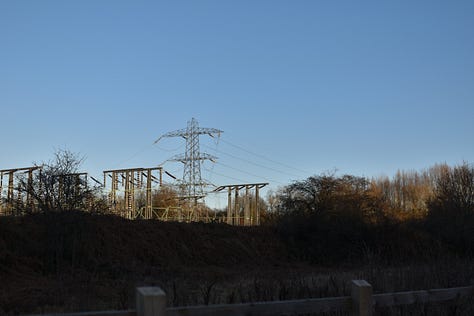Ten internal signs that I'm burned out:
As you may notice, this is basically a list of ADHD symptoms, which goes some way to explaining why it was so difficult for me as a recently diagnosed ADHDer to spot the them before it was ‘too late’.



Brain fog- unable to perform basic or routine tasks without great effort of thought.
Aphasia (loss of vocabulary) and confused speech.
Sensory processing difficulties (auditory, visual, proprioceptive, introceptive).
Increased sensory sensitivity and overwhelm.
Extreme fatigue.
Increased emotional dysregulation and irritability in combination with…
Increased episodes of dissociation.
Barely functional working memory.
Decreased executive functioning skills.
Headaches and digestive issues.
Another confounding issue is that fact that I have possibly still been in burnout since 2021 (idk what the ‘threshold’ is), but I’ve been able (forcing myself) to work through it, so I didn’t notice the escalation because it is so close to how I feel most of the time.
I saw this post on Instagram about two weeks ago listing signs of burnout (in NT peeps), which I shrugged off as being of little use to me as it seemed to describe ‘how it feels all the time with ADHD’!
I’m hoping that as I get used to knowing my (Oh God, do I really have to say it?! I’m sorry!) ‘new normal’, I’ll be better able to spot and stop it before it takes me down, but I’m taking steps in case I’m wrong! Such as letting those around me know to look out for…
5 External signs I was in/ approaching burnout:
(Ahhh the 20/20 vision of hindsight!)
Increased spending on non-essential items.
Scaled back wellbeing routines and avoided social events to conserve spoons1 for work.
Avoided booking therapy (Mondays) even though I knew I had things that needed to be processed, fearing lack of residual spoons for work week.
Missed scheduled group coaching call due to being late home after work and exhausted.
Using instant release medication boosters2 and caffeine to drown out my body’s stop signals.
Three Step Wellness Recovery Action Plan:
Step 1: REST!!!
Step 2: Reduce commitments, demands and mental expenditure.
Step 3: Reinstate wellbeing routines to soothe and support my nervous system:
Daily meditation and mindfulness practices.
Daily exercise; gym sessions/ walking/ kickboxing (when energy levels improve).
Daily time in nature.
Daily unstructured time.



Three preventative strategies to (hopefully) avoid future episodes:
Schedule (and do!) daily, weekly and monthly welbeing assessments.
Be honest with myself and other people about my wellness, needs, and boundaries.
Learn to let go of what was, stop trying to predict what may be, and embrace what is.
Easy Peasy!
Right?!😬
Of course not, but that’s what therapists are for!
If you know someone who could benefit from reading this, either because you suspect they may be suffering or approaching burnout, or if you need to explain to someone close to you how it feels, please do share.
My full WRAP has much more detail than I’ve shared here but they are personal to each individual, so if burnout is something you worry about, it’s worth putting some consideration into it before you need it. Earlier this week when I realised that I was burned out, another part of the evidence was that I couldn’t figure out what to do to begin to get better. The only reason I have this together so quickly is becuase I did the groundwork back in November when I had another substantial ‘blip’ in my mental health.
If you’ve got any tips, drop them in the comments- Let’s help each other if we can!
Spoon theory is an analogy created by Christine Miserandino to explain what it’s like to live with chronic illness (specifically Lupus) but can also help to explain the dificulties associated with many disabilities.
Read more here: https://butyoudontlooksick.com/articles/written-by-christine/the-spoon-theory/
How it specifically relates to ADHD: ADDittude Mag
These boosters are part of my prescription, but are supposed to be used at certain times in my menstrual cycle when my standard medication regime is less effective rather than a ‘quick fix’ or cheat.







Your featured photography in this post is really stunning. I especially love the series beginning with the goose. Such tension and reflection within your choice of photos--nature, human, infrastructure. All coexisting. Being. Rising.
Prior to reading this post, I was not familiar with the symptoms of ADHD overlapping so closely with burnout. I’m recovering from deep burnout myself which struck in Spring 2021. Having grace and learning to accept this new state of being has been a journey for certain. But now I see (and trust) it’s leading me to my most aligned life, in support of the natural flow of my body and mind.
I wish you grace and love, Emma.
The symptoms are also similar to fibromyalgia (which I have), just add in chronic pain. But confusingly, they are also symptoms of menopause (which I have just gone through, and you look too young for). Often we struggle on as things disintegrate slowly and we think the symptoms are normal. So it´s goof if you have been able to get an accurate diagnosis and you know what to do to be well. I wish you lazy times for a few weeks!